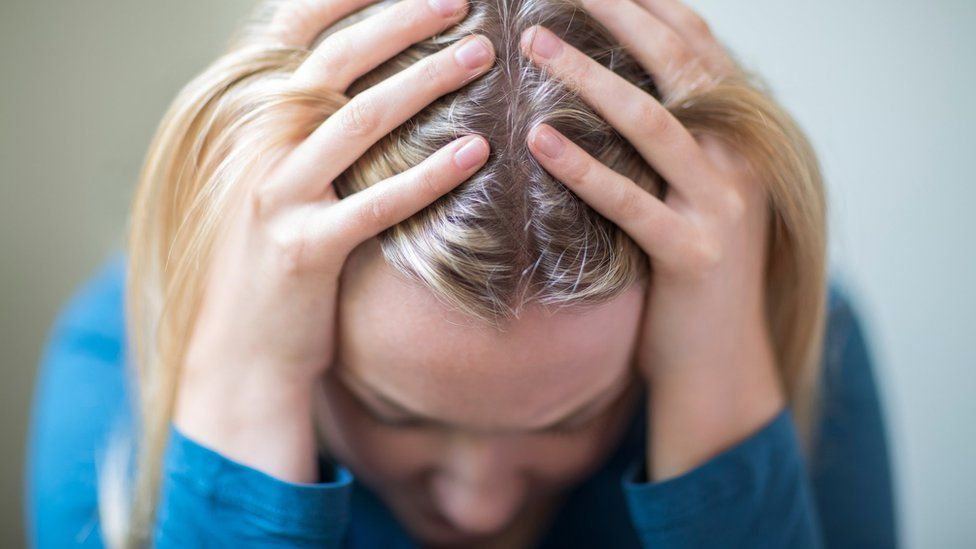Rape victims: Calls for pre-recorded evidence to be used in trials
- Published

Rape victims in England and Wales should be able to pre-record evidence and cross-examinations so that they do not have to face perpetrators in court, the victims' commissioner has said.
In a new report, Dame Vera Baird has called for the practice to be rolled out "as soon as practically possible".
It would also reduce stressful waits in the run-up to trials, she told the BBC.
The BBC understands the government is considering the move, but it is not clear how it would be implemented.
A plan will be laid out in a government review due to be published next month.
In a review of the provision for vulnerable and intimidated witnesses in courts, Dame Vera said pre-recording interviews would relieve unnecessary stress for those who had experienced sexual assault.
"We've found that almost everybody who was asked had heard victims say how frightened they were to come to court," she said.
They did not want to come face-to-face with the defendant or their "supporters", she said, nor did they want people in the public gallery.
She also said the practice would reduce the wait between the witness giving initial evidence to police and being cross-examined in court, which can sometimes be two years because of backlogs made worse by the pandemic.
Instead, the evidence and cross-examination could both be filmed soon after the alleged offence, and played to a jury in court once the case reached trial, without any further involvement from the victim.
'Traumatisation'
Dame Vera said this would mean the complainant could give their account "whilst their memory is good" then move on - and, if they choose, get therapy without fear that their notes could then be used by the defence.
She said asking people alleging rape to wait for years before being cross-examined "preserves the traumatisation" and can lead to them withdrawing from prosecution altogether.
Around 43% of rape complainants dropped out of prosecutions in the nine months to December 2020, according to Home Office figures.
Those who do proceed can give up if their case is listed for a certain date but cancelled last minute, Dame Vera said, adding: "It's a torture you don't have to put anyone through."
The law in England and Wales says that under "special measures", witnesses who are classed as vulnerable or intimidated are eligible to pre-record their initial evidence and cross-examination.
This practice was rolled out for all vulnerable witnesses - which includes all children - last year. However, it is not currently used for intimidated witnesses, which includes those who allege sexual offences.
A pilot was introduced in three courts September 2019 and an evaluation has not yet been published.
The victims' commissioner's report found that the guilty plea rate was "notably higher" when evidence was pre-recorded and the process was less traumatic for witnesses.
It also said, more broadly, that too often "special measures" - designed to help witnesses give evidence and relieve stress - were not being offered to those who were entitled to them.
These measures include the provision of screens to shield witnesses from the defendant in court, and the option to appear in court from a separate room via television link.
Among its recommendations is a call for the government to make sure that separate entrances and waiting rooms are available for vulnerable and intimidated witnesses, and to make greater use of remote centres where witnesses can give evidence without attending court.
The BBC understands that a government review to be published next month will also include plans to ask judges to bar the public from courts more often and to ensure mobile phones are returned to victims within 24 hours.
'Distressing'
Katie Russell, spokeswoman for Rape Crisis England and Wales, told the BBC that these measures, as well as pre-recording evidence, would have the "potential to improve the unacceptably low levels of criminal justice" that rape and sexual violence complainants receive.
"All sexual violence and abuse victims and survivors have been subjected to trauma and deserve trauma-informed and sensitive treatment," she said.
She also said the "significant length of time" that mobile phones were kept for had been "a cause for concern for some time".
"Being disconnected from friends, family and support networks at such a difficult and stressful time can undoubtedly be distressing," she said.
In a statement, the Ministry of Justice said: "We understand how traumatic the court process can be and despite the pandemic we are continuing to improve the support provided for victims."
"This includes protective screens and video links in every criminal court, more separate waiting rooms as well as piloting the pre-recording of cross-examination for rape victims to help further reduce the stress of attending court," it added.
"At the same time, a new Victims' Bill - set out in the Queen's Speech - will strengthen the rights of victims at every stage of the justice system."
If you've been affected by the issues in this video, you can find help and support from BBC Action Line.
Related Topics
- Published24 August 2020